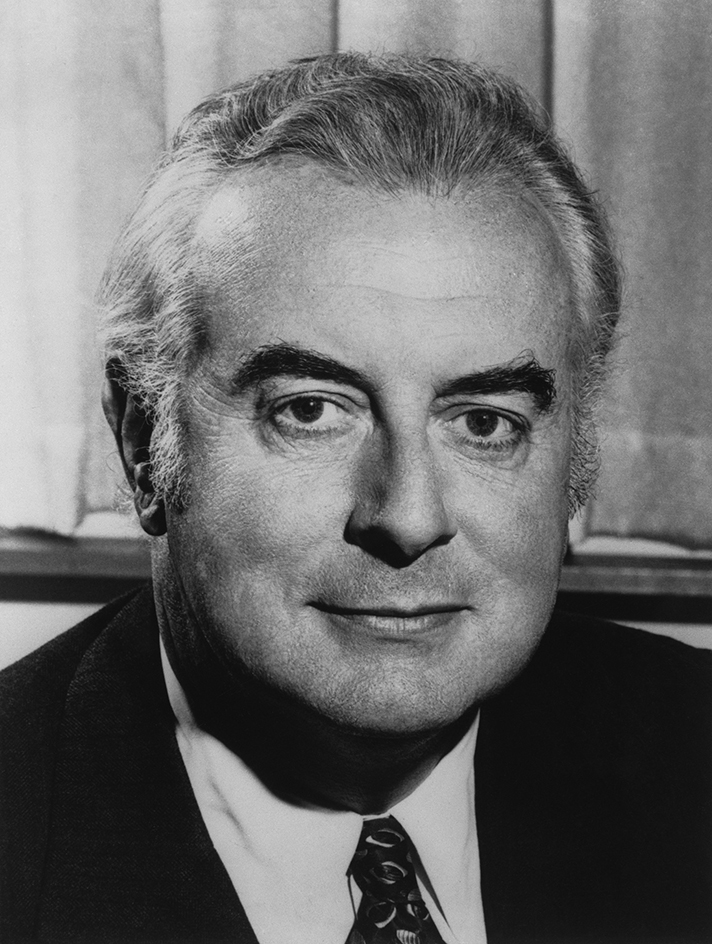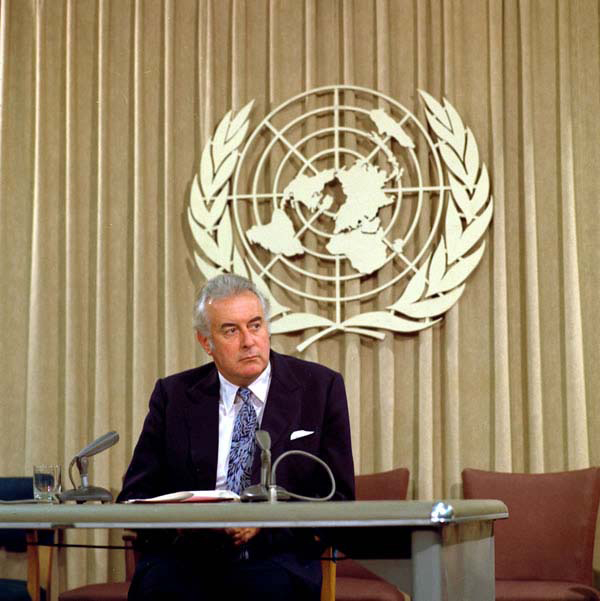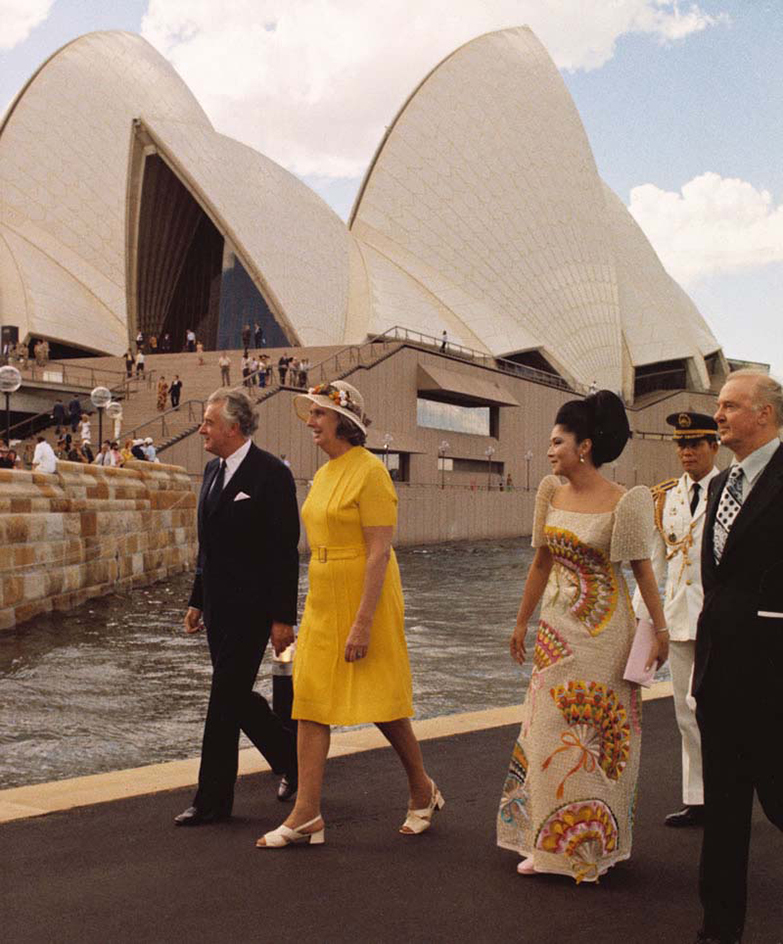Whitlam, Gough, << WIHT luhm, gawf >> (1916-2014), served as prime minister of Australia from 1972 to 1975. Whitlam was leader of the Australian Labor Party and the first Labor prime minister in 23 years. His liberal and reformist policies had a significant impact on Australian politics.

Whitlam’s administration was dogged by controversy. The climax came in 1975 when he became the first Australian prime minister to be dismissed from office. A deadlock between Whitlam and the opposing political parties had threatened to stop the operations of the government. As a result, Sir John Kerr, the governor general of Australia, removed Whitlam from office and called an election. In elections in 1975 and 1977, Whitlam’s Labor Party was unable to win control of the House of Representatives or the Senate. Whitlam retired from politics in 1978 but remained active in public life.
Early life
Boyhood and education.
Edward Gough Whitlam was born on July 11, 1916, in Kew, a suburb of Melbourne. H. F. E. Whitlam, his father, served as Australian Crown solicitor, an official who provided legal services to the government, and as Australia’s representative on the United Nations Commission on Human Rights. Gough attended several schools, including Telopea Park High School and Canberra Grammar School. He graduated from the University of Sydney with a bachelor’s degree in 1938. He received a law degree from the university in 1946.
Marriage and family.
On April 22, 1942, Whitlam married Margaret Elaine Dovey (born in 1919), a social worker and former champion swimmer. Margaret swam for Australia at the British Empire Games in Sydney in 1938. The couple had four children: Antony Philip (born in 1944), who became a judge and a member of Parliament; Nicholas Richard (born in 1945), who became a banker; Stephen Charles (born in 1950), who became a diplomat; and Catherine Julia (born in 1954).
Entry into politics
Whitlam served in the Royal Australian Air Force from 1942 to 1945, rising to the rank of flight lieutenant. After receiving his law degree, he was admitted to the bar—the body of lawyers who argue cases in higher courts—in 1947. He served as a member of the New South Wales Bar Council, a professional body for members of the bar, from 1949 to 1953. In 1952, Whitlam was elected to the Australian House of Representatives, representing the district of Werriwa. He held the seat until the end of his political career.
Whitlam rose steadily within the Labor Party, becoming deputy leader in 1960 despite the opposition of some of his Labor colleagues. On Feb. 8, 1967, he was elected leader of the party.
The Labor Party lost the 1969 election but increased its number of seats in the House of Representatives from 41 to 59. Whitlam was articulate and set a moderate tone that helped Labor connect more with middle-class interests. Whitlam also led a delegation to China, which enhanced his reputation in foreign affairs.
Prime minister
The Vietnam War, in which Australia’s military involvement had begun in 1962, was a major election issue in 1972. Other important issues in the campaign included education, social services, the rights of Indigenous peoples, and the role of women. Supporters of women’s rights established an organization called the Women’s Electoral Lobby to lobby for women’s issues, including equal rights in the workplace and for women seeking political office.
In December 1972, Whitlam led the Labor Party to victory in the House of Representatives and became prime minister. However, no elections were held for the Senate, which remained under the control of a coalition of the Liberal and Country parties. The Country Party soon became the National Country Party and later simply the National Party.
Government policies.
The Whitlam government, within its first months in office, abolished conscription (military draft) and withdrew the remaining Australian troops from Vietnam. Many Australians protested against the American bombing of Hanoi in December 1972. These moves all strained relations with the United States.
In foreign policy, Whitlam developed closer economic and cultural relations with Asia. The government adopted a policy of multiculturalism—that is, support for all cultures and ethnic backgrounds. Whitlam’s government established diplomatic relations with the Communist government of China in 1972. Australia granted Papua New Guinea self-government in 1973 and independence in 1975. Whitlam’s government also began the reduction of Australia’s tariff policy.

Domestically, Whitlam’s government introduced a number of progressive measures. The government established Medibank, a national health plan, and substantially increased funding for education and city development. The government promoted the rights of Australia’s Indigenous peoples—the Aboriginal peoples of Australia and the Torres Strait Islander peoples—and pushed for reforms in land rights in the Northern Territory. The voting age was reduced to 18. Reforms in the area of family and women’s rights included the Family Law Act of 1975, which modernized divorce laws.
The Whitlam government increased government support and funding to the Australian film industry, which boomed as a result. In 1973, the government created the Australia Council, an organization that supported the performing arts.
Criticism and dismissal.
Despite its many reforms, the Whitlam government was plagued by problems, as an economic recession began to take its toll on Australia. Opposition politicians accused Whitlam of overspending on government programs, leading to inflation and unemployment.
In 1974, the Senate refused to pass government legislation, which led to a double dissolution—that is, both the House of Representatives and the Senate were dissolved. The elections that followed gave neither party a majority in the Senate. But in 1975, a coalition of the Liberal and National parties gained control. Two Labor vacancies had occurred, and the state governments of New South Wales and Queensland filled the vacancies with senators opposed to the Whitlam government.
During the summer of 1975, a political and financial scandal called the “loans affair” forced Whitlam to remove some Cabinet ministers. The loans affair had been an unauthorized attempt by Rex Connor, minister for minerals and energy in the Whitlam government, to raise funds from Middle East sources for government programs.

In October 1975, Malcolm Fraser, head of the Liberal Party, used the scandal as an excuse to block the approval of funds in the Senate. The Liberal and National parties used their power in the Senate to threaten to stop the supply of money for day-to-day government operations. They hoped to force Whitlam to resign, paving the way for new elections. After Whitlam refused to step down, the opposition parties blocked the approval of funds needed to run the government.
A constitutional crisis followed, and in November 1975, Sir John Kerr, the governor general, removed Whitlam from office. Kerr named Fraser to serve as prime minister until new elections could be held. Whitlam continued to lead the Labor Party until his retirement in 1978.
Later years
During the late 1970’s and the 1980’s, Whitlam taught at a number of Australian universities—including the Australian National University, the University of Sydney, and the University of Adelaide—and at Harvard University in the United States.
He was Australia’s representative to the United Nations Educational, Scientific and Cultural Organization (UNESCO) in Paris from 1983 to 1986, and he served on UNESCO’s executive board from 1985 to 1989. Whitlam served on Australia’s Constitutional Commission, a group of legal experts and political leaders appointed to review Australia’s Constitution, from 1986 to 1988. From 1986 to 1991, he was chairman of the Australia-China Council, a government body that worked to improve relations between Australia and China. In 1978, Whitlam was made a Companion of the Order of Australia. The Order of Australia is Australia’s highest award for service to the country or to humanity.
Whitlam defended his ideas and actions in several books and essays, including The Truth of the Matter (1979), The Whitlam Government, 1972-1975 (1985), and Abiding Interests (1997). Throughout his life, Whitlam was fascinated by Italian history and culture, which led to the publication of his My Italian Notebook (2002). Whitlam died on Oct. 21, 2014.
See also Australian Labor Party (ALP) ; Barwick, Sir Garfield ; Fraser, Malcolm ; Kerr, Sir John .
